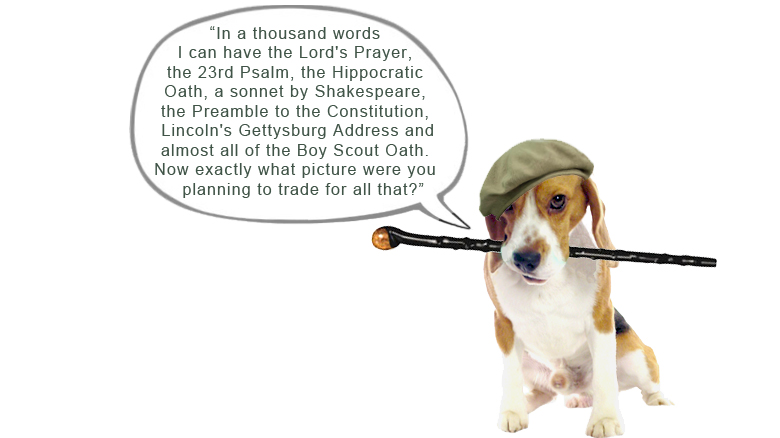I began losing my hair when I was 19. By the time I was 21, I looked like I was 30.
Best thing that ever happened to me.
People take you seriously when you look like a grown-up, and I needed people to take me seriously.
I sold advertising for the smallest radio station in Tulsa, Oklahoma. We were rock-solid at number 23 in a city of 23 radio stations. We had a 0.5 share during the Average Quarter Hour. This means that out of every 200 radios that were turned on, only 1 of them would be tuned to my station.
Best thing that ever happened to me.
At any given moment, my station would have between 500 and 800 people listening. But the total number of different people we would reach in a week was about 18,000. Woo-Hoo! I was overjoyed. There wasn’t a single business in our city of 1,000,000 people that couldn’t use 18,000 more customers.
All I had to do is figure out what to say to get my 18,000 people to remember – and prefer – my advertiser. I cannot say with certainty how I knew success would be found in the crafting of a persuasive message rather than in the selection of the “right” audience, but my memory shows me a young boy sitting in an empty classroom reading books during recess rather than playing with the other kids on the playground.
Best thing that ever happened to me.
Yes, I know I’ve said “Best thing that ever happened to me” three times and they can’t ALL be the “best thing,” but I don’t feel like ranking them “#1 Best,” “#2 Best,” etc., so go with the flow, okay?
I restricted my sales calls to businesses that were so tiny they couldn’t afford any advertising other than my little nothing of a radio station. When these people believed in me and wrote me a check, they were giving me their life’s blood. If my plans for them failed, my clients couldn’t pay the rent. They couldn’t send their kids to school with a sack lunch. They couldn’t pay the electric bill.
When you face those kinds of consequences, you lie awake at night figuring out how to make the ads you sold work, because there is no one with whom you can share the blame. It’s all you.
Guilt, Pain and Remorse are powerful teachers.
I quickly figured out how to make advertising work.
And what Guilt, Pain and Remorse taught me was very different from what is being taught in colleges.
Few marketing professionals will ever be solely responsible for the outcomes of the ad campaigns they help to create. Most people in my profession go to college, get a degree, and then become a cog in a marketing machine. Their failures can be attributed to a wide variety of forces beyond their control. Their ink pens are never filled with the blood of the families for whom they write.
My station owner was hoping our little station might bring in about $11,000 a month. Within 18 months, my personal billings were averaging $51,000 a month. My base pay was $800/mo. and I made a 15% commission. Do the math.
I spent my early twenties as a joyously married, rapidly balding boy with ten thousand stories in his head and an ink pen full of blood in his pocket. Then, at 26 years old, they made me the General Manager of a much larger station.
Worst thing that ever happened to me.
I no longer spent my days talking face-to-face with business owners and crafting stories. Instead, I stared blankly at spreadsheets and spoke by telephone with corporate officers and bookkeepers and listened to the whining of 32 employees who had me confused with their mommies.
Six months into it, I said, “You can keep the cheese. Just let me out of the trap.”
With the unwavering support of Princess Pennie, I became an independent ad writer and media negotiator. I adapted my stories to fit billboards on the highway and TV ads during the Superbowl and websites on the internet.
But some things never change. Thirty-four years after saying “no” to spreadsheets and corporate politics, my relationships continue to be one-on-one with business owners, never with the companies they own.
I don’t believe in destiny.
I believe in choices and consequences.
I believe each of us chooses what we become.
What have you chosen to become?
If plan A isn’t working out for you, consider plan B or C or D!
New choices bring new consequences.
Isn’t life a wonder?
Don’t forget to live it.
Roy H. Williams
 “Like any published memoir, our own life stories should also come with a disclaimer: ‘This story that I tell about myself is only based on a true story. I am in large part a figment of my own yearning imagination.’ And it’s a good thing, too. As we will see, a life story is an intensely useful fiction.”
“Like any published memoir, our own life stories should also come with a disclaimer: ‘This story that I tell about myself is only based on a true story. I am in large part a figment of my own yearning imagination.’ And it’s a good thing, too. As we will see, a life story is an intensely useful fiction.”
– Jonathan Gottschall, The Storytelling Animal: How Stories Make Us Human
 Ty Crandall knows the ins and outs of finding funds to fuel a business without having to give lenders a personal guarantee. Most business owners know very little about how to obtain business credit. Even little things like choosing the right name and email address for your business can make the difference between approval and rejection. Roving reporter Rotbart has interesting answers about money matters at MondayMorningRadio.com
Ty Crandall knows the ins and outs of finding funds to fuel a business without having to give lenders a personal guarantee. Most business owners know very little about how to obtain business credit. Even little things like choosing the right name and email address for your business can make the difference between approval and rejection. Roving reporter Rotbart has interesting answers about money matters at MondayMorningRadio.com
